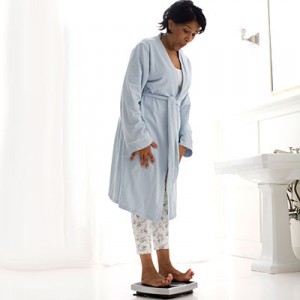Is belly fat creeping up on you? It’s possible that it’s not weight gain, but pounds that may have shifted due to hormonal changes, childbirth, or weakening bones. While there is a correlation between gaining weight and growing older, aging itself is not a cause. If it were, everyone over seventy would be obese.
So what is? Your metabolism can slow by five percent each decade, meaning that you’ll burn fewer calories as you age. Muscle mass also diminishes. The result: your old regimen doesn’t work anymore and you gain weight from simply doing nothing at all. But it is possible to become fit as we grow older.
Studies show that the average body weight and BMI (body mass index, a measure of weight in relation to height) increase over time, but physical activity and walking decrease. It’s lifestyle choices like these that often lead to weight gain: eating the wrong foods, consuming too much food, and the lack of proper exercise in our daily lives.
Not all calories are created equal – the biggest culprits to avoid:
• Potato chips
• French fries and other potatoes
• Unprocessed red meats
• Processed meats
• Liquid calories in the form of sugar-sweetened beverages (soda), alcoholic beverages, and fruit juices
Smart snacks associated with less weight gain:
• Yogurt
• Vegetables
• Nuts
• Fruits
• Whole grains
Lifestyle factors to consider:
• Increase physical activity
• Limit time in front of the television
• Regulate sleep time – 6-8 hours per night is optimal
• Steer clear of crash diets and ineffective exercise strategies
Weight gain with age doesn’t have to be inevitable. A recent study shows that an assortment of lifestyle choices – not just the number of calories in your diet – can influence the numbers on your scale. Suggestions for prevention of packing on the pounds include a healthy diet and a daily exercise plan, such as walking just 30 minutes each day. Walking is both affordable and accessible, so use that to your advantage. Strength training or lifting weights can also help by maintaining or even building muscle mass which increases one’s metabolism.
Visit an expert at your local gym or fitness center to receive a body-fat reading. Any reading over 30 percent is a signal for some major changes. But no crash diets! Slashing too many calories sends your body into starvation mode which carries its own ill effects. Monitor your calories, try to stay within 1200-1500 per day, and drop pounds slowly and safely. Bring on the cardio, but pepper it with strength training to burn more calories and build muscle mass. Then switch things up by varying your routine and adding a few short, fast-paced bursts of speed to your regular treadmill, cycling, swimming, or other aerobic routine. As you grow stronger, it’s advisable to add more intervals, make them longer, and more intense. You know the old expression, “Breakfast is the most important meal of the day”? Well, it is. You need it to get your metabolism going for the day. Oatmeal, eggs, and even peanut butter – anything with fiber and protein – are your best bets. Then do your best to decrease stress and increase your sleep. That’s right, relax and get some shut eye! Taking care of yourself now will help keep you and your belly fit and trim – and aging gracefully!





Follow Kristy